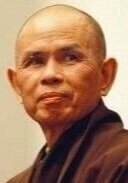“When you plant lettuce, if it does not grow well, you don't blame the lettuce. You look for reasons it is not doing well. It may need fertilizer, or more water, or less sun. You never blame the lettuce. Yet if we have problems with our friends or family, we blame the other person. But if we know how to take care of them, they will grow well, like the lettuce. Blaming has no positive effect at all, nor does trying to persuade using reason and argument. That is my experience. No blame, no reasoning, no argument, just understanding. If you understand, and you show that you understand, you can love, and the situation will change.”
― Thich Nhat Hanh
“If you understand, and you show that you understand, you can love, and the situation will change”.
Part of understanding a person or situation comes from being a good listener. If we're not listening and only hear parts of the conversation then conflict or confusion arises quickly. It takes practice to say nothing and to listen without interrupting.
When we listen and pay attention in the present moment, then we're giving good care to family and friends, without judgement, blame or negativity, giving them the opportunity to express themselves fully with understanding and love.
When we adapt, we stay focused, have more energy and stay alert. When we are in constant state of anxiety, negativity and feelings of intolerance and frustration our health can begin to suffer. Sleeping becomes difficult, heart rate and blood pressure is affected, the immune system may start to break down and the body prints out all types of health problems.
As Meditators we are more likely to adapt having the ability to stay and play, rather than flighting or fleeing.
Our twice daily meditation corrects the intellect and brings more tolerance and harmony to the nervous system.
Laugher with our partner, family or friends, brings joy and is reflected in the nervous system. Watching a violent movie, the impression of that voilence is recorded in the brain. Whatever we put our attention on become a part of us. Remember how important it is to choose activities that nourish us and support those connections that help maintain a healthy outlook.
More on “Love” from Great Masters -
Maharishi Mahesh Yogi –
"Love opens all doors, no matter how closed they may be, no matter how rusty from lack of use. Your work is to bring unity and harmony, to open all doors which have been closed for a long time. Have patience and tolerance. Open your heart all the time."
“Our attention is like fertilizer – whatever we put it on grows”. Maharishi Mahesh Yogi
Thom Knoles - Maharishi Vyasananda Saraswati
What is Love?
All love comes from within one's own innermost self and returns to one's own innermost self. It is a journey from here to here. It appears to go "there", but "there", also, is actually nowhere but here.
Yes, funnily enough, the goal of the process of loving is the enriching, rewarding effect that the love phenomenon has within oneself.
To love is to uplift and expand one's own innermost self.
To elaborate, all currents of love, just like all currents in the ocean, are sourced within one's own innermost self, and have their release back into one's own innermost self.
This Love-loop, from within one's own innermost self, via the loved "other", back into one's own innermost self, generates some gracious behaviour on the way.
That love-behaviour is there to be enjoyed by others, as long as one's love continues en route from oneself to oneself, circling round and round, with its pretext, "the loved one" being the theme song for it all.
While one's circular love-current lasts, an auxiliary beneficiary of one's own self-referral love-behaviour may be the other person, this much-lauded "loved one", but, actually, one's love is self-sufficient.
While loving, one would swear that "the loved one", is the source and cause of one's love, but this is a mirage.
The hallucination that, "the one I love is the source and the cause of my love", vanishes instantly the moment that one no longer can enjoy the behaviour of one's love-focus.
Then, suddenly, all of one's currents of love stop, and all one wants is solitude, or someone more readily enjoyable, in order that the enriching, rewarding Love-loop, from oneself to oneself, can recommence.
When someone becomes stressed, his capacity to adapt successfully to changes of expectation becomes retarded; resulting in a very narrow range within which he can enjoy the behaviour of his love-focus, his "loved one".
At the slightest challenge to his expectations, the stressed one falls out of love easily and seeks solitude or someone less challenging, more enjoyable. But his stress will keep his enjoyment range very narrow and his intolerance will make him fall into and out of love repeatedly.
Perhaps he will become extremely cynical about the whole "love thing", even though, in fact, he falls into love, and instantly out of love, continuously and secretly. His love-behaviours will be accordingly sporadic.
He cannot keep the Love-loop, and its concomitant love-behaviours, going.
Just as he attributed mistakenly his self-referral love-phenomenon to his loved one, invariably he will attribute mistakenly his falling out of love to some new, or newly discovered, "intolerable" behaviour of his (now former) loved one.
When people learn to meditate, their adaptation capacity expands. Their tolerance for change expands. Their recognition expands that they are, in themselves, the source and the cause of their own experience.
Meditators progressively let go of the conviction that, "someone else caused my
experience".
With meditation, one can keep the Love-loop going longer.
This is what our world needs desperately.
Jai Guru Deva


